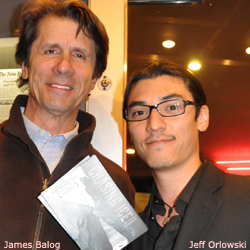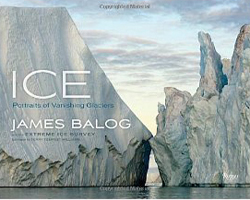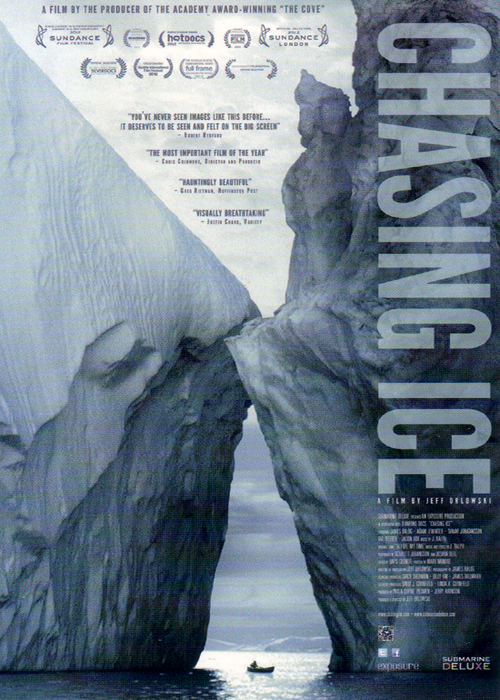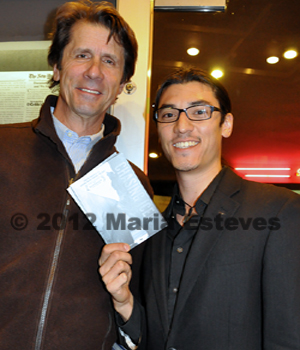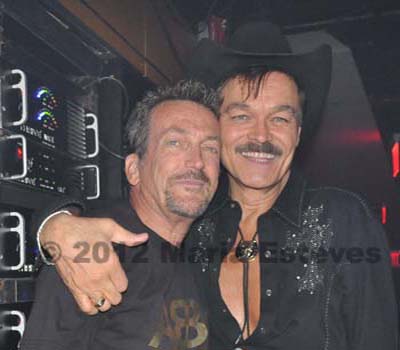|
|
||
|
Pro Tools
FILMFESTIVALS | 24/7 world wide coverageWelcome ! Enjoy the best of both worlds: Film & Festival News, exploring the best of the film festivals community. Launched in 1995, relentlessly connecting films to festivals, documenting and promoting festivals worldwide. Working on an upgrade soon. For collaboration, editorial contributions, or publicity, please send us an email here. User login |
Remembering Award Winning Humanitarian Zelda KaplanBy Maria Esteves – March 3, 2012 If only one life is spared, my existence has been justified, is the way humanitarian, celebrity artist Zelda Kaplan (1916-2012) lived her life. An artist who collects rare African ritual carvings from West Africa, a Golf champion, a professional dancer, and trainer in Ballroom International and Cuban style. Zelda’s findings of rare African ritual carvings in West Africa inspired her humanitarian efforts on marital violence, FGM (Female Genital Mutilation), and the right of a wife to inherit. On Wednesday, February 15, 2012, while sitting front row at Joanna Mastroianni Fall 2012 runway show during Mercedes-Benz Fashion Week New York, Zelda Kaplan collapsed and passed away into eternity. I had the distinct privilege of interviewing Award winning Humanitarian Zelda Kaplan in New York, Wednesday, November 29, 2006. ME: What inspired the need to serve humanity? ZK: In the late 1960’s, I went to Israel with my mother and two sisters. It was a beautiful trip. As a member of the American Museum of Natural History, I attended lectures and had the fortune of meeting Dr. Margaret Mead, one of our greatest anthropologists. The lectures peeked my interest in ritual carvings. In the 1970’s, I made my first trip to West Africa, which is famous for Ritual Carvings. While renting a little dirt house in the villages, I learned about marital violence and heard women screaming abruptly during the day and at night. I felt I had to do something. I began to invite the men and women for coffee and talk to them about my life, my two husbands, and how we negotiated our problems with conversation. In 1983, I made my first trip to Ethiopia and a young Canadian woman who was a volunteer staying at a hotel in the capital city of Addis Ababa informed me about Female Genital Mutilation (FGM), the cutting of the clitoris and/or labia - a tiny opening is kept to allow passage of urine. The people that perform the procedure are indigenous. They use glass, stone or a little knife and also cut into the anus or bladder. The procedure has been going on for thousands of years as a ritual. In the village, the women are told the cutting makes her clean. A man becomes sterile and brings bad luck to the whole village if he marries a woman who is not cut. When I returned to New York, I began to research the physiological effects of FGM. In 1987, during Operation Moses (Ethiopian Jews transport to Israel) I volunteered for three months to teach English and western dancing in Netanya, Israel. I also returned to Ethiopia and alerted the people in the villages about the physiological effects of FGM. The people in the villages never connected the actual procedure with sickness that showed up in women years later that made them sterile. During my first visit to Ethiopia, I met a very important Ethiopian woman in the village who owns all sorts of businesses and we talked about FGM. During my second visit, I stayed with her a few days and talked about many things. As I was getting ready to leave the village in a Toyota Land Cruiser vehicle, she knocked on the car window and said, “My three little grand children, I’m not going to have them cut”. I was so overcome I started to cry. ME: What films did you starred and what awards have you been honored? ZK: In 2003, my documentary HER NAME IS ZELDA, directed by Nicole Maxwell premiered at Tribeca Film Festival (TFF) and at Martha’s Vineyard Independent Film Festival (MVIFF). In 2005, I starred in BEYOND THE LADIES ROOM DOOR, directed by Alise Bennett. In 2006, I was the recipient of the Humanitarian Award at the Queens International Film Festival (QIFF). Zelda Kaplan, right, accepts the Humanitarian Humanitarian Award winner Zelda Kaplan, holding her award as she exit the stage at the Queens International Film Festival 2006 Closing Night Awards Ceremony, Astoria, New York on Sunday, November 19, 2006. ME: Where were you born and what did you studied?
ZK: I was born on June 20, 1916 at St. Francis Medical Center in Trenton, and lived in a farm outside of Flemington, New Jersey. I went to Dana College Law School, which now is called Rutgers University. In law school, I met my first husband and got divorced eleven months later. In 1940, I met my second husband, which was introduced to me by my mother. He was a medical doctor and he didn’t want two career people in the family. Being a very traditional woman and loving him, I didn’t finish law school and became very busy being a dutiful wife. I began playing golf when we moved to Miami Beach. I wanted to have children but he didn’t. In the late 1950’s, we were divorced. I sold the house, moved back to my parent’s home in New Jersey and concentrated on playing golf. I joined two country clubs and became the lady champion of both clubs. I played in many tournaments and won beautiful trophies. ME: At what point in your life you became interested in the performing arts? ZK: In 1963, since I was not competitive enough to play in the national golf competitions, I moved to New York and studied Ballroom Dancing, International Style (Waltz, Tango, Foxtrot, Quickstep). I found the best coach named Alex Dessandro and proved to be an apt student. A few years later, Alex invited me to teach for him and began coaching competition teams. One of my teams won the United States Ballroom Championship. Then I decided to study Cuban style dancing (Mambo, Cha-cha, Bolero, Guajira). During the day, I worked at an art gallery with my uncle, which made me very interested in arts. I started going to gallery openings and become member of different museums. After work, I taught dancing and at night I went out dancing at the Roseland Ballroom. I had a dance partner for ballroom international style and a partner for Cuban style. ME: Any new projects currently being considered? ZK: In the past few years, my humanitarian efforts concentrated on marital violence, FGM, and the right of a wife to inherit. I never tell people what they are doing is wrong. I show them 100% respect. Now that I’m past 90 years of age, I plan to return for the fourth time to Guinea, West Africa in February 2007, and visit the father of two young girls who told me he did not cut his daughters because of what he learned concerning the physiological effects of FGM. If only one girl has not been cut because of Zelda Kaplan, my existence has been justified. Therefore, when I am in Manhattan, I play! I get dressed up, go to the clubs (Bungalow 8 owned by Amy Sacko, Double Seven, Gramercy Park Hotel Lounge, etc.) have a glass of champagne, and enjoy the company of young people who are interesting to talk with. For more information on Zelda Kaplan contact: http://www.zeldaworld.org 04.03.2012 | Aviva Press's blog Cat. : Addis Ababa African ritual carvings Alex Dessandro Alise Bennett American Museum of Natural History Amy Sacko Artist Astoria Award Winning Humanitarian Ballroom Championship Ballroom Dancing Ballroom International Ballroom International Style BEYOND THE LADIES ROOM DOOR celebrity artist coach Contact Details Cuban style Dana College dancer Director Ethiopia Fall 2012 Collection Female genital mutilation Feminism Fiction Flemington Francis Medical Center Games Gender-based violence Gramercy Park Hotel Lounge Guinea HER NAME IS ZELDA http://www.zeldaworld.org Human Interest Human Interest Israel Margaret Mead Marie J. Castaldo Mercedes-Benz Fashion Week Mercedes-Benz Fashion Week Miami Natural History Netanya New Jersey New York New York New York Nicole Maxwell Nintendo Person Career Person Location Princess Zelda professional dancer Quotation Roseland Ballroom Rutgers University Rutgers University The Legend of Zelda the Queens International Film Festival Toyota Toyota Land Cruiser Tribeca Film Festival United States West Africa West Africa Women's health Women's rights Zelda Kaplan Zelda Kaplan Interviews PEOPLE
|
LinksThe Bulletin Board > The Bulletin Board Blog Following News Interview with IFTA Chairman (AFM)
Interview with Cannes Marche du Film Director
Filmfestivals.com dailies live coverage from > Live from India
Useful links for the indies: > Big files transfer
+ SUBSCRIBE to the weekly Newsletter Deals+ Special offers and discounts from filmfestivals.com Selected fun offers
> Bonus Casino
User imagesAbout Aviva PressThe EditorUser contributions |



















